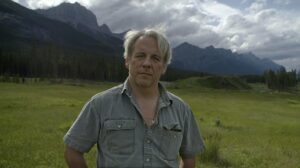Successful play from Curve Lake First Nation playwright adapted into documentary

By Sam Laskaris
CURVE LAKE FIRST NATION – A feud in central Ontario involving wild rice will once again bring Drew Hayden Taylor some recognition.
Taylor, a Curve Lake First Nation author/playwright/filmmaker, wrote a play a few years ago titled, Cottagers and Indians.
The play was about his friend from his First Nation, James Whetung who seeds, grows and harvests wild rice on Pigeon Lake, much to the dismay of many cottage owners and some residents of Curve Lake First Nation, which lines the shores of the lake.
The play had successful runs across the province, including various stops in Toronto.
Had it not been for the coronavirus disease 2019 (COVID-19) pandemic, productions of that play would have been staged in Port Perry, Kincardine, and Wiikwemkoong Unceded Territory this year. A New Brunswick production was also cancelled because of COVID-19.
There are still plans, however, for the play to be performed in the Maritimes later this year.
Taylor then turned his play into a book, also titled Cottagers and Indians, which ended up being shortlisted for the 2020 Stephen Leacock Memorial Medal for Humour.
Now, Taylor’s play and book have been adapted into a documentary. Cottagers & Indians will premiere this Saturday at 8 p.m. (EST) as part of CBC Docs POV, the station’s flagship documentary series.
It will also be available on the free CBC Gem streaming service.
Taylor’s documentary differs from his play and book as he travels to three Indigenous communities across Canada to include issues in those centres.
“I got to see some of these other issues,” Taylor said. “All of them deal with history. It’s interesting. And you have to have a real understanding of colonization to appreciate it.”
The documentary also differs from Taylor’s play and book, which are both based on fictional Otter Lake, instead of Pigeon Lake. Whetung’s real name is also used in the documentary, instead of the character Arthur Copper, utilized in the play and book.
In his documentary, Taylor explains the controversy on Pigeon Lake. Whetung believes it a right of food sovereignty, which allows him to have his wild rice operation, covering about 1,800 across the lake.
Others have been embroiled in a decade-long battle with Whetung as they feel his wild rice hinders their boating, waterskiing and swimming experiences.
“You have to come in with a certain sense of objectivity,” Taylor said. “The thing about the documentary is we tried to show both sides of all the issues.”
Taylor is also pleased with the documentary as he was able to portray the real-life story of what is happening between Whetung and his neighbours.
“The play was a dramatization of the issues,” he said. “A lot of the stuff we made up. I took the issue, blew it out of proportion and went with it.”
Taylor further cements the friction occurring on Pigeon Lake by detailing a pair of controversial battles as well as a positive situation involving other First Nations across the country.
For starters, he travels to Shoal Lake 40 First Nation in Manitoba, a community that has been under a boil water advisory for more than 20 years. That community is suffering from an aqueduct dug to supply the city of Winnipeg with clean tap water.
Taylor also travelled to Sauble Beach, a popular tourist location in Ontario, where there has been a long-standing dispute of who rightly owns the land.
Taylor’s documentary also explores how a prosperous First Nation, the Osoyoos Indian Band in British Columbia, can successfully co-exist with non-Indigenous partners in its community.


